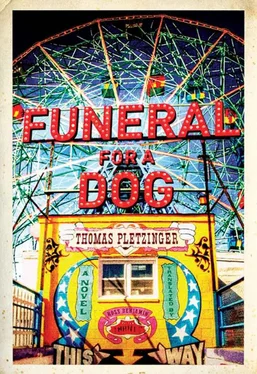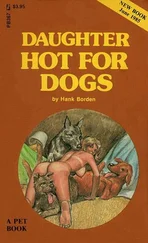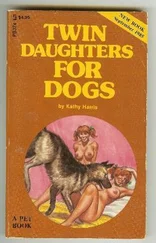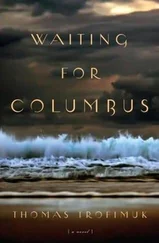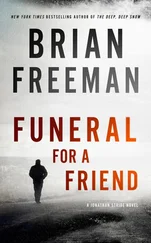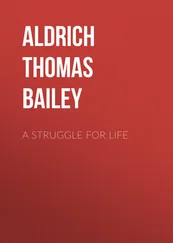Claasen talks
Am I from Hamburg too? Someone hands plates to Claasen and me (chicken, fish, tomatoes). Then our evening here is officially an exile meeting. I work on Speersort? Yes, I say. He himself was a magazine man from day one, Der Spiegel . Claasen names names, I nod. I name names, Claasen nods. He lives on the slope over Osteno, he always came here with his children and his wife, they spent every summer since 1964 here, his children practically grew up here, such a beautiful place! I agree with him. He took projects with him, even under the old vacation provisions there were always four weeks. Now he writes only occasionally. Claasen bites into a chicken thigh. He values the seclusion, the climate too, the food. Does he occasionally burn things, I ask Claasen, but he doesn’t understand: he has a fireplace, of course, but he spends the winters in Hamburg anyway. Claasen says that he doesn’t know Elisabeth, he’s heard of her ex-husband, yes, but he’s never met him in person. I sit next to him and observe Svensson, the creator of stories, stoking the bonfire. Claasen’s wife has been dead since 1989, his children now have children themselves, and he’s a grandfather. His grandchildren come visit him in the summer, he never thought things would go this far. Claasen laughs. Svensson’s world is a web of reasons and references. A world in which every gesture, every word, every thing has a meaning that I can only suspect (the understanding of cultural systems). It sounds mundane, says Claasen, but I’m a satisfied man.
Lua leaves
Svensson is sitting next to Samy and feeling the dog’s pulse. When the candles have almost burned down and the fire is only glowing darkly, he stands up and taps a wine glass with a spoon (laughter and chatter). Tuuli takes the bottle from the boy, because Lua doesn’t want to drink anymore, and Svensson climbs onto the bench with the lion heads. Claasen and I halt our conversation, the other conversations die away too, all the guests raise their glasses. Svensson climbs onto the lion bench in front of the oleander and looks at Kiki. When he begins to talk, the cicadas cease their screaming, the water black and quiet between the mountains, the large birds are resting. The death of pets and livestock, says Svensson, isn’t usually assigned excessive importance in this region. He will now explain why that’s different in Lua’s case. The guests are sitting on Svensson’s chairs like churchgoers. Svensson is a good speaker, he tells the stories of events I’ve already read about, he varies his themes, he alternates between languages, he talks Italian, German, English, and everyone understands what he’s saying. Svensson tells anecdotes and stories, he makes the guests laugh, he pauses at the right points, the guests are glowing with emotion and affection and candlelight. Svensson praises Lua’s life, his connoisseurship of women and international beer brands, his courage and his political development. Svensson gives the saddest speech of his life, a eulogy for the barely breathing dog, the guard and herding dog of the highest quality, the former police dog of Seraverde, for the good soul of Astroland, Coney Island. As Svensson raises his glass to the best dog in the world, the guests too stand up one after another, they murmur prayers and wishes, they laugh and praise Lua, they pull handkerchiefs from pants pockets and skirts and handbags, they pet his forehead the way people pet dying dogs’ foreheads (animals, the hearts of people, Svensson wrote). Then the talking and Ping-Pong playing resume, the wine and beer, the rattling of plates, the celebrating, the dying of the dog, the chatter and laughter. Around midnight Claasen tips his hat. The guests pat Svensson on the shoulder and kiss Kiki on the cheeks, they tousle Samy’s hair, they nod to Tuuli and me. Then one after another they board the boats at the dock. Today is a special day, today is a sad day. And when the rudders can no longer be heard in the water, when Claasen too has ultimately disappeared into the woods, Svensson kneels down next to Lua and lays his hand on his chest. Grief falls over the lake. Kiki buries her face in her hands, and even Tuuli forgets to smoke (I know how Elisabeth cries). Lua opens his eyes and closes them again, and even in the screaming of the cicadas I can hear the dog’s voice: Ciao ragazzi , says Lua, e arrivederci . Svensson runs his fingers carefully over the dog’s face, then he stands up and nods to us. Kiki doesn’t bother to wipe away her tears anymore, now they’re running unimpeded down her cheeks, and then Tuuli, too, starts to cry, for the second time today. Samy has fallen asleep with his head on the dying dog’s chest (Lua, the heart of his fathers). I don’t know what to do, so I go back to the house (anything else would be too personal now). Lua isn’t breathing, I hear Svensson say, Lua isn’t breathing anymore.
Knowledge Forwards and Backwards
Svensson came back to the room that I’ve been calling the study up to this point (without knocking, without a word). I stood up from my notes and his desk, and Svensson pulled out Blaumeiser’s suitcase from under the desk. He said that he needed the suitcase now. Could I help, I asked, and he smiled at me with a strange friendliness: no. I stay behind and have to surmise, because I can’t make out anything clearly (for the field researcher wait time is synonymous with work time, his presence is his work).
Why am I still here?
I summarize, because summaries facilitate understanding: Lua is dead. Felix Blaumeiser already died three years ago, he drowned on the other side of the lake. Svensson has struggled as everyone struggles, he’s conceded his defeats. He’s not a player, but he has lost nonetheless. Svensson is no stranger than the rest of us. At some point he decided to stop playing the game, and turned to the tangible things: Svensson and the painter Kiki Kaufman have a daughter named Bella. Bella has two teeth (the research intern did a terrible job). Svensson and Kiki are turning a ruin into a house, they’re turning a study into a nursery, they plant and harvest and breed animals and slaughter and cook. They cry for Lua. Svensson carried the heavy piece of luggage effortlessly down the stairs, but then I could hear his curses through the window (his bulky baggage). I wonder why Svensson has taken the suitcase out of the room this evening, I wonder what’s going to happen with the Astroland manuscript. Svensson is carrying his story out of the house, what remain are Tuuli’s golden hairpins, along with Svensson’s books and my ring. The torches have burned down, the motion detector is off, even with the binoculars I can’t make out the dead dog by the water (the moonlight isn’t enough). Kiki and Svensson collect stories and paint pictures, they hang these pictures on their walls (“Knowledge Forwards and Backwards,” Kiki calls it, they want to make their past inhabitable). I wonder what’s done with dead animals here. I wonder where Tuuli is at the moment.
things in the dark
I wonder what Elisabeth would say about these things (I should talk to her). I’ve spent four days taking notes and haven’t completed Elisabeth’s assignment, I’ve asked simple questions and gotten complicated answers. I’ve stayed on the lake instead of leaving. I’ve washed off Elisabeth’s blood in the water, I’ve kissed Tuuli. I turn out the light (maybe things will be discernible in the dark).
Bella & Samy
The crack of light from the hallway illuminates their way, Kiki and the children are standing next to me. Kiki says that she’s now superfluous, as she lays her sleeping daughter down on the mattress. Samy is clinging to the hem of her dress and rubbing his eyes, she lays him down next to Bella and covers the two of them with my blanket, after all, she says, someone has to look after the children. Then she sits down on the floor under the window. She nods. This is now between Tuuli and Svensson and the dog, she says, smiling wearily and seriously at me, she doesn’t necessarily have to watch. I have no idea where to begin, I begin, but Kiki’s whisper interrupts me in English, you said you’re married, Daniel? Yes, I say. No response, we’re sitting in semidarkness: Kiki in the wedge of light, I at the desk. After four days I take the ring from the desk and put it on the proper finger (E. E. E.). Switching back to German, Kiki says that I probably know that everyone has his skeletons in the closet — or, for that matter, in a suitcase. She assumes so, anyway. What do skeletons have to do with my being married, I ask, what does she mean by that (I know what she means). Instead of answering, Kiki asks for a pencil and paper, all her supplies are temporarily stored in the shed. There’s nothing to answer, I give her the hotel bill from the desk and tear a page out of my notebook, I hand her the crayons with which Samy made out his prescription. Danke , Daniel, says Kiki. Lua shouldn’t die sad, the little Dottore said (Lua didn’t die sad).
Читать дальше
